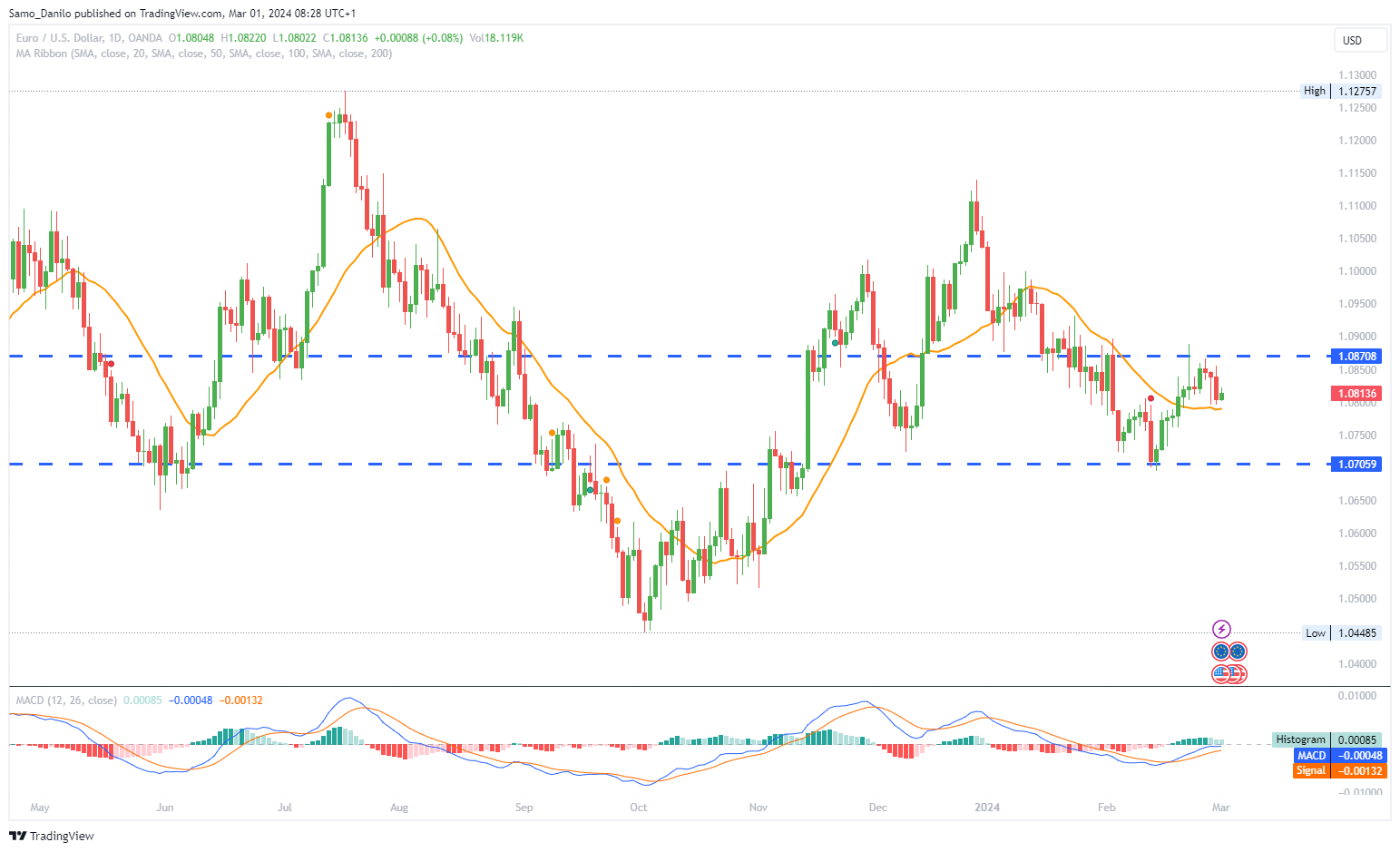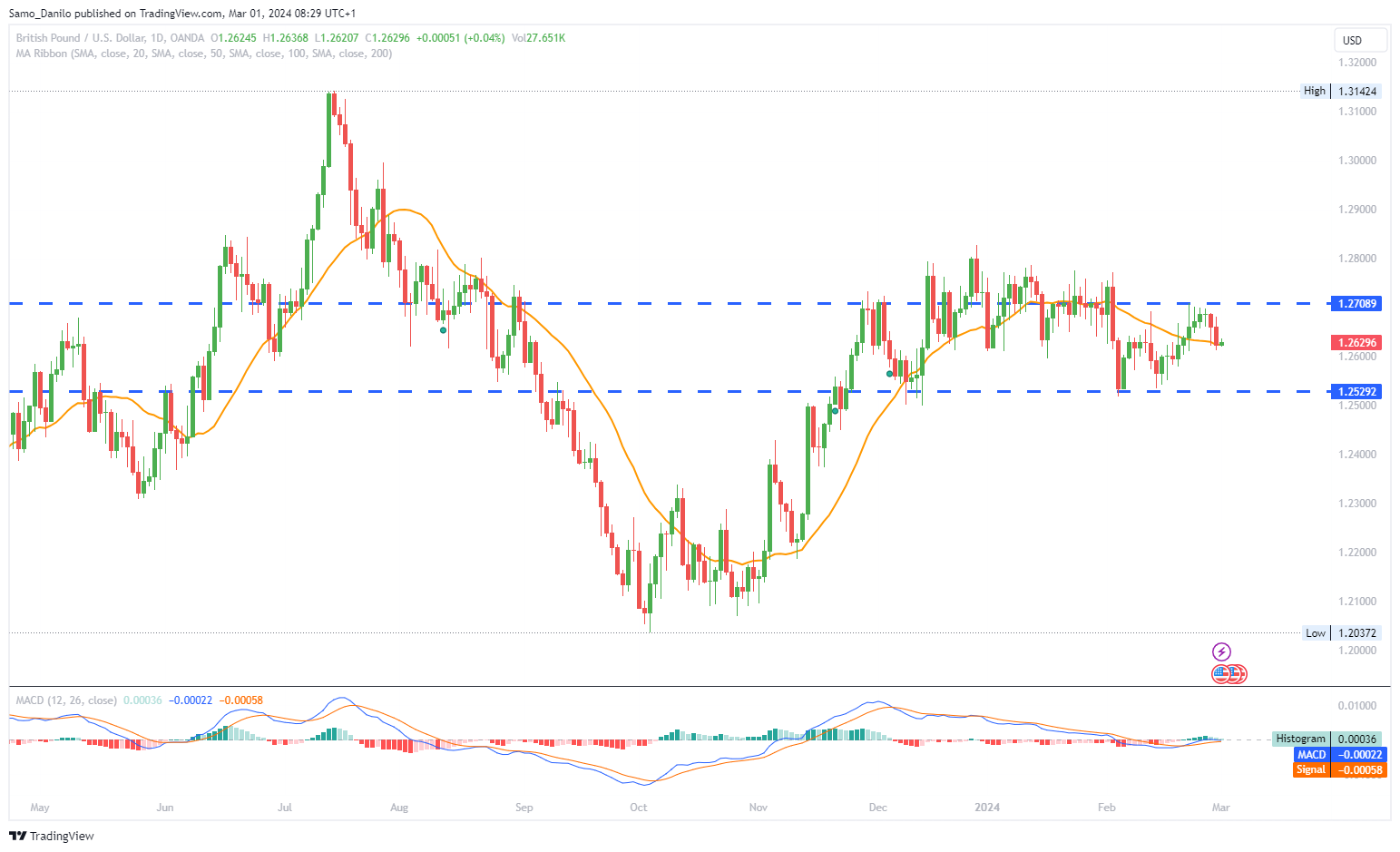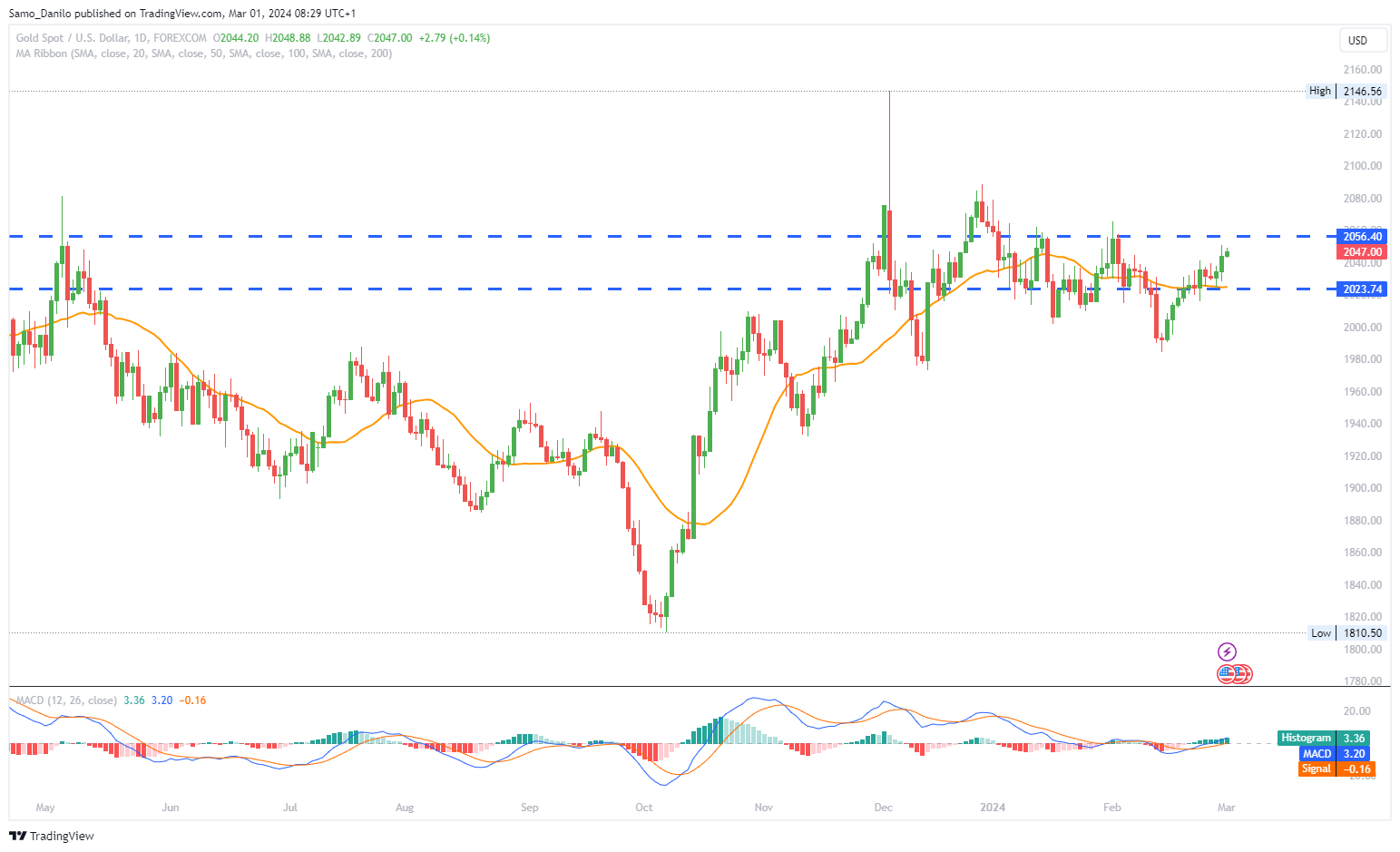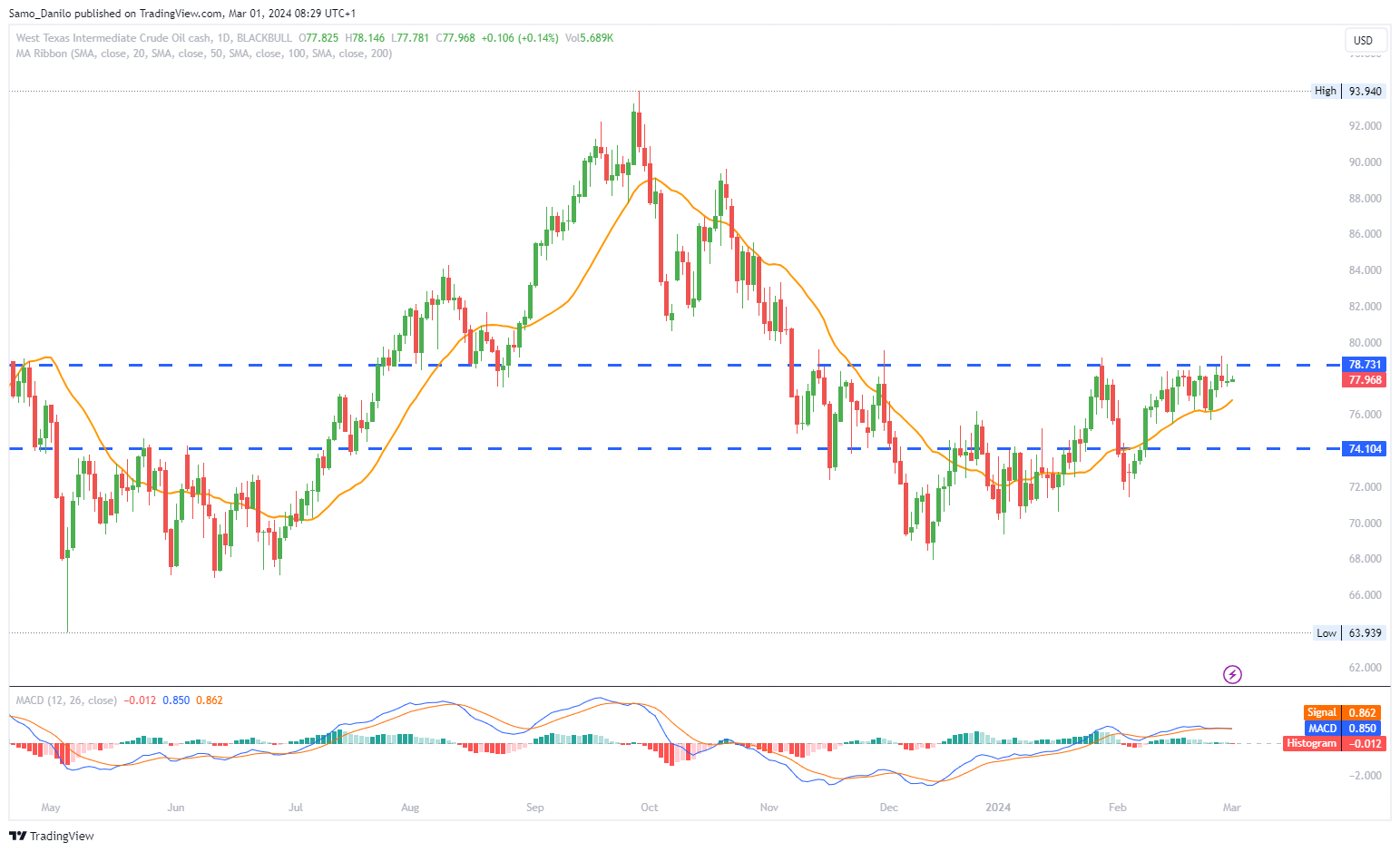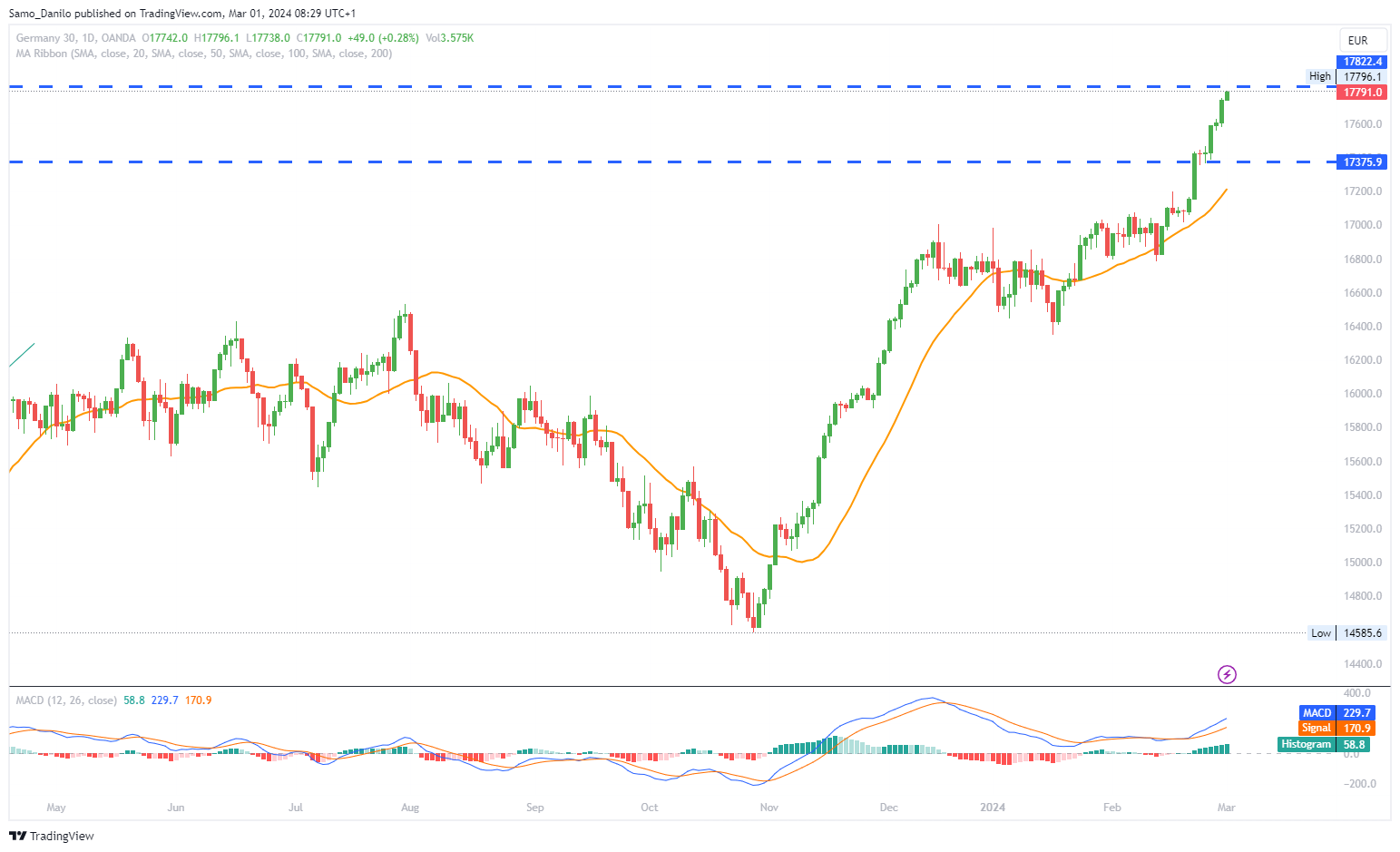EURUSD
- EUR/USD Weekly Retracement: EUR/USD extended its weekly retracement for the third consecutive session, challenging the critical 1.0800 level on Thursday. This retracement was in response to a robust increase in buying interest around the US Dollar (USD).
- US Dollar Dynamics: The US Dollar faced renewed selling pressure after the US Personal Consumption Expenditures (PCE) data revealed persistent disinflationary pressure in January. This weakened the USD initially.
- USD Regains Balance: However, the US Dollar appears to have regained balance, particularly after comments from Atlanta Fed President Raphael Bostic. Bostic suggested that recent inflation data indicates a challenging path to reaching the 2% inflation target, signaling a more measured approach to rate changes.
- ECB's View on Easing Cycle: The European Central Bank (ECB) shares the view that the start of the easing cycle might occur at some point during the summer. Board member Peter Kazimir expressed his preference for the beginning of the bank’s easing cycle in June.
- Inflation Debate: The report emphasizes the ongoing debate around inflation, with flash Consumer Price Index (CPI) readings for the entire eurozone expected at the end of the week. These readings are anticipated to contribute to the discussion regarding the timing of a potential ECB rate cut.
Closing statement:EUR/USD experienced a retracement against the US Dollar, initially reacting to disinflationary pressures in the US. However, the USD regained balance, influenced by comments from Fed officials. The report underlines the ECB's perspective on a potential easing cycle and highlights the upcoming flash CPI readings as crucial for the ongoing debate on the timing of an ECB rate cut.
GBPUSD
- GBP/USD Small Gains: GBP/USD is recording marginal gains above the 1.2600 level in the European trading hours on Friday.
- US PCE Price Index Data: Data from the US Bureau of Economic Analysis (BEA) released on Thursday indicated that the Personal Consumption Expenditure (PCE) Price Index eased from 2.6% to 2.4% year-on-year (YoY). This was in line with market expectations.
- BOE's Potential Rate Cuts: There is speculation that the Bank of England (BoE) might delay a pivot to rate cuts compared to the Federal Reserve (Fed), potentially providing support to the Pound Sterling (GBP).
- BOE Deputy Governor's Comments: BoE Deputy Governor Dave Ramsden expressed a cautious approach, stating that he wants to observe how long inflation will remain elevated before considering a shift in the monetary policy stance.
- Upcoming Economic Indicators: Looking forward, the UK Nationwide Housing Prices data is scheduled for release on Friday. Additionally, on the US economic docket, the final S&P Global Manufacturing Purchasing Managers' Index (PMI) and the final Michigan Consumer Sentiment figures are expected.
| SMA (20) | Slightly Falling |
|
| RSI (14) | Slightly Rising |
|
| MACD (12, 26, 9) | Slightly Rising |
|
Closing statement: GBP/USD is experiencing minor gains, influenced by US PCE Price Index data that met market expectations. Speculation about the BOE potentially delaying rate cuts compared to the Fed is a factor supporting the Pound. The cautious stance of BoE Deputy Governor Dave Ramsden and upcoming economic indicators, including UK Nationwide Housing Prices and US manufacturing and consumer sentiment data, will likely influence further movements.
GOLD
- Consolidation near Four-Week Highs: Gold price is consolidating near four-week highs of $2,051, indicating preparations for the next potential upward movement.
- Thursday's Performance: In Thursday's North American trading, gold prices rose over 0.50% following the release of the US Personal Consumption Expenditures - Price Index (PCE) Index.
- Chinese Sector Activity Influence: Gold is benefiting from an improvement in the services and manufacturing sector activities in China, as indicated by the latest data from China’s National Bureau of Statistics (NBS) and Caixin. China, being the world’s top gold consumer, contributes to the positive sentiment.
- Hawkish Fed Commentaries: The upside in the gold price was, however, restrained by hawkish commentaries from Federal Reserve (Fed) policymakers. Atlanta Fed President Raphael Bostic mentioned that recent data indicates the journey back to the central bank’s 2% inflation goal will be "bumpy."
- Upcoming Focus: Looking forward, attention remains on the US ISM Manufacturing Purchasing Managers' Index (PMI) data and end-of-the-week market flows, which could provide fresh trading impetus for gold prices. Additionally, speeches from various Fed officials, including Williams, Logan, Waller, Bostic, Daly, and Kluger, are scheduled.
| SMA (20) | Neutral | |
| RSI (14) | Slightly Rising |
|
| MACD (12, 26, 9) | Rising |
|
Closing statement: Gold is consolidating near four-week highs, supported by positive data from China's sectors. However, the influence of hawkish comments from Fed policymakers has restrained significant upward movement. Focus remains on upcoming economic indicators and speeches from Fed officials for potential market direction.
CRUDE OIL
- Technical Support at 200-day SMA: West Texas Intermediate (WTI) US Crude Oil prices experience buying interest near the technically significant 200-day Simple Moving Average (SMA) during the Asian session on Friday, suggesting a level of technical support.
- Easing Inflation Impact: The anticipation of easing inflation in the US is seen as a factor that might prompt the Federal Reserve (Fed) to initiate interest rate cuts in June. This expectation is likely to boost fuel demand in the largest oil consumer globally.
- Global Oil Market Dynamics: Record-high US production and increased output from the Organization of the Petroleum Exporting Countries (OPEC) have signaled that global oil markets may not be as tight as initially expected. This dynamic could influence the supply and demand balance.
- Concerns Over Crude Demand: Economic challenges, including a recession in Japan and the UK, coupled with a dimming economic outlook for the Eurozone, raise concerns about the demand for crude oil. Weak economic conditions in major regions suggest a potential decrease in crude consumption.
- Weekly Gains: Despite concerns, crude oil remains on track to register strong weekly gains. This marks the third week of positive movement in the previous four weeks.
| SMA (20) | Rising |
|
|
| RSI (14) | Rising |
|
|
| MACD (12, 26, 9) | Rising |
|
|
Closing statement: WTI Crude Oil prices find technical support at the 200-day SMA. Anticipation of easing inflation in the US is a potential driver for increased fuel demand. Global oil market dynamics, including record-high US production and OPEC output, impact the supply and demand balance. Concerns over crude demand are present due to economic challenges in major regions. Nevertheless, the commodity is set to record strong weekly gains, signalling positive momentum.
DAX
- German Retail Sales Decline: On Thursday, German retail sales experienced an unexpected decline of 0.4% in January, signaling potential economic challenges and recessionary signals. The decrease in consumer spending might have implications for demand-driven inflation and create conditions conducive to an ECB interest rate cut.
- Concerns Over Unemployment: Unemployment numbers in Germany raised concerns about the economic landscape. The unemployment rate rose to 5.9% in January (revised from 5.8%), and it remained steady at 5.9% in February. Elevated unemployment rates can be indicative of economic challenges.
- Impact of Softer German Inflation: Despite economic concerns, softer-than-expected German inflation numbers drove demand for DAX-listed stocks. The annual inflation rate fell from 2.9% to 2.5% in February. This could influence investor sentiment and market dynamics.
- Upcoming Focus on German Manufacturing PMI: On Friday, the German Manufacturing Purchasing Managers' Index (PMI) will draw investor interest. The preliminary survey indicates a decline in the Manufacturing PMI from 45.5 to 42.3 in February. Manufacturing data can provide insights into economic activities and industrial health.
- Eurozone Inflation Numbers: In addition to the German Manufacturing PMI, inflation numbers for the Eurozone are anticipated to have a significant impact. Softer-than- expected inflation figures could contribute to speculations about an April ECB rate cut, influencing market trends.
| SMA (20) | Rising |
|
|
| RSI (14) | Rising |
|
|
| MACD (12, 26, 9) | Rising |
|
|
Closing statement:The DAX faces economic challenges as German retail sales unexpectedly declined, signalling potential recessionary signals. Concerns over unemployment rates in Germany add to the uncertainties. Softer-than-expected German inflation numbers drove demand for DAX-listed stocks, reflecting market dynamics. The upcoming focus on German Manufacturing PMI and Eurozone inflation figures will likely impact investor sentiment, providing insights into economic activities and potential ECB actions.
